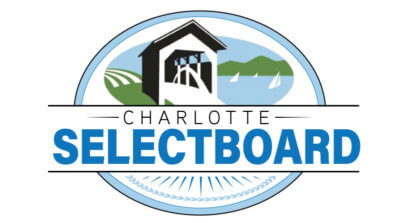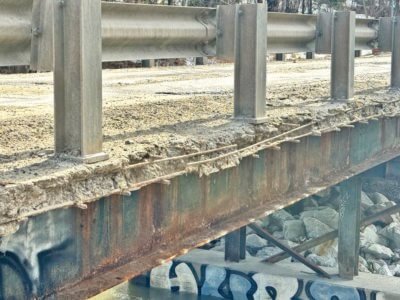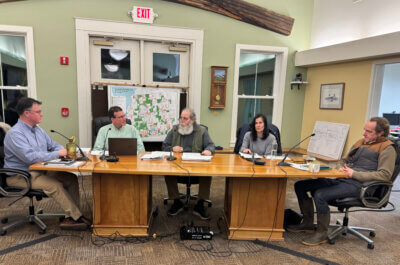Conservation Commission donation — if
The Charlotte Conservation Commission wants to carry out a comprehensive update of the town’s “significant wildlife habitat map,” but it doesn’t have the money to do it. A generous resident says he’ll help, but only if the selectboard chips in, too — and that isn’t certain.
Yet putting off the task may not be an option. According to conservation commission chair Claudia Mucklow, the creation of a town plan demands an accurate habitat map.
In Vermont, municipalities rewrite their town plans every eight years in accordance with requirements set by the state. Charlotte most recently adopted one in 2019. It last updated its habitat map in 2008.
“You have to know where you want to concentrate your development and which areas are important to carve out for wildlife,” Mucklow told the selectboard on Monday.
The first part of the update would cost an estimated $10,000, which would pay for a biologist’s services. Mucklow recounted applying to the state for a municipal planning grant during each of the past three years. Each time the conservation commission received a denial. The hope of landing that grant simultaneously led the selectboard to reject its appeals for municipal funding.
The same thing happened during budgeting season this year. Nevertheless, in February, the commission sent out requests for proposals to consulting firms. Two responded in May with offers to redo the habitat map.
“You need a professional,” Mucklow said. “This requires a lot of knowledge and also fieldwork.”
Fiscal year 2026 starts on July 1. Selectboard member Natalie Kanner wondered whether Charlotte would close out fiscal year 2025 with unspent funds that officials could reallocate toward the map.
But her colleague Frank Tenney argued that the selectboard didn’t have the authority to use such a surplus — if it existed — for any purpose beyond lowering the tax rate. Otherwise, by his understanding, they’d have to save it for fiscal year 2027.
If the selectboard doesn’t figure out a way to finance at least a portion of the habitat map’s update, the town may miss out on a significant charitable donation. Conservation commissioner Pete Demick stood up suddenly during Monday’s meeting and declared that he’d pay $5,000 out of pocket if the town covered the remainder.
“I’d like to incentivize you to do it,” Demick said. “Find five grand, and I’ll write you a check.”
Private users will pay sewer system’s administrative costs
Private users of the west village wastewater system must pay a quarterly “administrative and infrastructure fee.” The seemingly minor question of whether the town should charge itself the same fee for its own facilities’ use of the system became, in the words of selectboard chair Lee Krohn, “an interesting philosophical question” for elected officials, ending in a rare split vote.
The town built the wastewater system to serve its municipal buildings. More recently, it has attracted additional hookups, which have made the management of the system more complex. The town has determined that, each quarter, its customers should collectively contribute $1,250, split evenly, for the costs of inspections and billing.
But does a municipal building count as a customer? If so, the fee for each private user would decrease; each would pay a smaller share of the $1,250. Kanner supported that reduction, characterizing Charlotte’s high sewer fees as a symbol of hostility toward new development in the west village
“This is one small thing that we can offer to just show that we want to see some things happening here,” she said. “I think that’s a fairly significant statement to make with a fairly small financial contribution.”
The town owns the wastewater system and approves new users on a discretionary basis. Selectboard member Lewis Mudge worried that treating the municipality as one of the system’s customers would jeopardize its authority as the system’s owner.
“It would put us in effect as an equal partner,” he said.
JD Herlihy voted in favor of Kanner’s motion to include town buildings among the payers of the “administrative and infrastructure fee.” But with Mudge voting against it alongside Frank Tenney and Lee Krohn, the motion failed.
Energy committee moving forward with decarbonization
In May, the selectboard authorized the Charlotte Energy and Climate Action Committee to enter what it called “phase two” of a planning process aimed at eliminating the use of fossil fuels in town buildings by installing heat pumps and building solar arrays of various types to power them.
Since then, the committee has drafted a dozen requests for proposals, each of which corresponds to one component of the plan. On Monday, the committee asked the selectboard for permission to circulate these requests for proposals among vendors.
Unfortunately, due to an electronic error of some sort, none of the selectboard members had received the digital files until shortly before the meeting. They hesitated to approve a set of documents that they hadn’t had time to examine. Worse, the meeting’s agenda had warned only a discussion of the matter, not a possible vote.
After some hemming and hawing, the selectboard approved the RFPs anyway.
“It doesn’t bind us to anything,” Krohn said.
Krohn emphasized that point amid expressions of uncertainty among his colleagues regarding the hasty timeline of the energy committee’s proposed project, which must break ground before the end of the year to avoid unfavorable changes to the rules and rates for solar net metering in Vermont.
Meanwhile, the project’s financial viability appears to lie in the hands of the U.S. Senate as it considers President Trump’s “One Big Beautiful Bill,” which will likely cancel many of the federal incentives for clean energy. Just how soon those subsidies would disappear upon the bill’s passage remains unclear, according to energy committee member Jim Hodson.
Town planner selected
After an executive session, the selectboard approved an offer of employment for Lindsay Kahn, who, if she accepts, will fill the long-vacant town planner position. Charlotte’s last town planner, Larry Lewack, retired at the end of 2024.
Town administrator Nate Bareham told The Charlotte News that Kahn has worked at the Federal Highway Administration and has more than a decade of experience, mostly as a transportation planner.
New wastewater system operator at Thompson’s Point
The selectboard also moved to terminate the town’s contract with SJW Docks, which operates and maintains the Thompson’s Point Wastewater Disposal System. Simon Operating Systems will step in.
The town attorney hasn’t yet finalized the letter of cancellation or the new agreement. “Unfortunately, I really can’t comment on that right now,” Bareham said.
During the public comment portion of the meeting, Jim Foster, a camp owner at Thompson’s Point, spoke in support of SJW Docks, pointing to “31 years of faithful professional service to the town and the leaseholders both. It’d be a shame if one particular incident with one particular camp owner upset that relationship.”
Related Stories
Popular Stories
If you enjoy The Charlotte News, please consider making a donation. Your gift will help us produce more stories like this. The majority of our budget comes from charitable contributions. Your gift helps sustain The Charlotte News, keeping it a free service for everyone in town. Thank you.
Andrew Zehner, Board Chair





